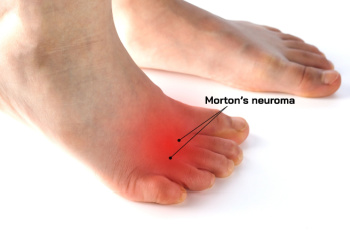Items filtered by date: May 2025
Symptoms and Treatment of Morton’s Neuroma

Morton's neuroma is a painful foot condition that occurs when a nerve becomes compressed between the metatarsal bones, typically between the third and fourth toes. Patients may feel a sharp, burning, or stabbing pain in the ball of the foot, along with tingling, cramping, or numbness in the toes. It may feel as though a small object, such as a pebble, is stuck inside the shoe. As the condition progresses, the pain may become more frequent and intense. A podiatrist can diagnose Morton's neuroma through a physical exam and specific compression tests, sometimes supported by imaging. Treatment may involve custom shoe inserts to reduce pressure on the affected nerve or corticosteroid injections to reduce inflammation. If these measures do not relieve symptoms, surgery might be required to either remove the thickened nerve tissue or release the ligament causing the compression. If you experience symptoms of Morton's neuroma, it is suggested that you schedule an appointment with a podiatrist for appropriate treatment.
Morton’s neuroma is a very uncomfortable condition to live with. If you think you have Morton’s neuroma, contact Gary J. Kaiserman, DPM of Achilles Footcare Center. Our doctor will attend to all of your foot care needs and answer any of your related questions.
Morton’s Neuroma
Morton's neuroma is a painful foot condition that commonly affects the areas between the second and third or third and fourth toe, although other areas of the foot are also susceptible. Morton’s neuroma is caused by an inflamed nerve in the foot that is being squeezed and aggravated by surrounding bones.
What Increases the Chances of Having Morton’s Neuroma?
- Ill-fitting high heels or shoes that add pressure to the toe or foot
- Jogging, running or any sport that involves constant impact to the foot
- Flat feet, bunions, and any other foot deformities
Morton’s neuroma is a very treatable condition. Orthotics and shoe inserts can often be used to alleviate the pain on the forefront of the feet. In more severe cases, corticosteroids can also be prescribed. In order to figure out the best treatment for your neuroma, it’s recommended to seek the care of a podiatrist who can diagnose your condition and provide different treatment options.
If you have any questions, please feel free to contact our offices located in Forest Lane and West Kiest Boulevard Dallas, TX . We offer the newest diagnostic and treatment technologies for all your foot care needs.
